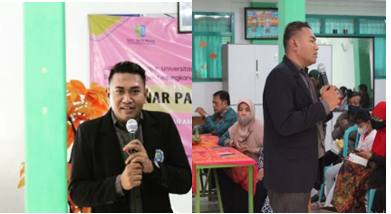Pengelolaan Administrasi Pembelajaran Berbasis Digital dalam Meningkatkan Kemampuan Arsip Data Bagi Guru Sekolah Luar Biasa
##plugins.themes.academic_pro.article.main##
Abstract
The purpose of this service is to provide training to improve the ability to manage learning archive data which is an important thing for students with special needs, this is because the track record of learning administration records and so on is sustainable. The methods used in this service activity include, 1) coordination with partners regarding follow-up findings on problem analysis; 2) preparing a team of materials and media; 3) providing socialization to partners regarding the design of service activities; 4) Implementation of service activities; 5) Evaluation of participants after service activities. The results of the service of managing data archives using SIMAPGU (Teacher Training Administration Management System) with a website-based system, can be accessed using various types of existing devices. Based on the results of the implementation of the service activities, the results of increasing the competence of special school teachers in designing special programs for students with special needs were 92%.
##plugins.themes.academic_pro.article.details##

This work is licensed under a Creative Commons Attribution-NonCommercial 4.0 International License.
JURPIKAT (Jurnal Pengabdian Kepada Masyarakat) accepts manuscripts that have not been published elsewhere and are not under consideration for publication by other print or electronic media. Authors retain copyright and grant the journal right of first publication with the work simultaneously licensed under a Creative Commons BY-NC License that allows others to share the work with an acknowledgment of the work's authorship and initial publication in this journal.
Authors are able to enter into separate, additional contractual arrangements for the non-exclusive distribution of the journal's published version of the work (eg, post it to an institutional repository, in a journal or publish it in a book), with an acknowledgment of its initial publication in this journal.
License to Publish
The non-commercial use of the article will be governed by the Attribution-NonCommercial 4.0 International (CC BY-NC 4.0). The author hereby grants JURPIKAT (Jurnal Pengabdian Kepada Masyarakat) an exclusive publishing and distribution license in the manuscript include tables, illustrations or other material submitted for publication as part of the manuscript (the “Articleâ€) in print, electronic and all other media (whether now known or later developed), in any form, in all languages, throughout the world, for the full term of copyright, and the right to license others to do the same, effective when the article is accepted for publication. This license includes the right to enforce the rights granted hereunder against third parties.
References
Al-Musawi, A. S., & Al-Maliki, A. K. (2019). The Role of E-Learning Management System in Enhancing the Educational Process in Iraqi Universities. International Journal of Advanced Computer Science and Applications, 10(3), 50-57.Winkel, W. S., & Hastuti, M. S. (2005). Bimbingan dan konseling di institusi pendidikan. Yogyakarta: Media Abadi.
Alshammari, F., Wills, G., & Wald, M. (2019). An Exploratory Study on the Effectiveness of Moodle as a Learning Management System in Saudi Arabian Universities. In 2019 8th International Conference on Educational and Information Technology (ICEIT) (pp. 70-74). IEEE.
Edmodo. (2021). About Edmodo. Diakses dari https://www.edmodo.com/about
Firdaus, M. F., Riyanto, R. E., & Setiyadi, A. (2020). Design and Implementation of Teacher Competency Test Information System. Journal of Physics: Conference Series, 1465(1), 012044
Hamilton, E. (2019). How Technology Is Changing the Way We Teach and Learn. The Guardian. Diakses dari https://www.theguardian.com/education/2019/sep/10/how-technology-is-changing-the-way-we-teach-and-learn
Hamzah, A., & Rusdiah, S. (2021). The Use of E-Office Documents Management in High Schools (Case Study at SMAN 1 Ambunten-Sumbar). Journal of Physics: Conference Series, 1938(1), 012067.
Herman, T., Hadad, E., & Soedirman. (2017). Pengembangan Media Pembelajaran E-Learning pada Mata Kuliah Kewirausahaan. Jurnal Pendidikan Teknik Elektro, 6(2), 343-350.
Jumanto, J., Wibisono, S., & Santoso, H. B. (2019). E-Learning Development to Optimize Teacher Performance in Creating Online and Offline Exams. Journal of Physics: Conference Series, 1233(1), 012126.
Kim, H., & Lee, J. (2018). The role of e-learning readiness and attitude to smart learning on smart learning competency. Asia Pacific Education Review, 19(3), 335-345.
Munadi, Y., & Astuti, R. D. (2020). The Inclusive Education Competence of Special Needs Teachers in Designing Learning Programs. Universal Journal of Educational Research, 8(5), 2269-2275.
O'Dwyer, L. M. (2013). Technology integration in schools: Suggestions for success. Journal of Technology and Teacher Education, 21(3), 297-308.
Prayitno, Y. D., Priyono, B., Asfariani, P., Suryani, A., & Novikasari, I. (2021). The Implementation of Special Needs Education in Inclusive Schools in Central Java, Indonesia. Journal of Gifted Education and Creativity, 8(1), 41-50.
Rahayu, W. A., & Krisdianto, K. (2019). Training of Inclusive Education for Special School Teachers to Improve Their Competence in Designing Learning Program. Journal of Primary Education, 9(2), 149-156.
Reinaldo, G., & Rinaldi, N. (2019). Design of Indonesian-Java Scaffolding E-Book Based on Mobile Responsive Web. In Journal of Physics: Conference Series (Vol. 1321, No. 2, p. 022053). IOP Publishing.
Sumardjo. (2018). The Role of a Teacher in Developing Inclusive Education for Students with Disabilities. Journal of Learning and Teaching in Digital Age, 3(1), 13-18.
Wahyuni, E., Dewi, N. R., & Yusuf, M. S. (2021). Training Development for Teachers in Inclusive Schooling for Students with Disabilities. Journal of Education, Teaching and Learning, 6(1), 127-132.
Zou, D., & Peng, H. (2017). Study on Design of Education Website for College English Teaching. DEStech Transactions on Social Science, Education and Human Science, 129-135.

